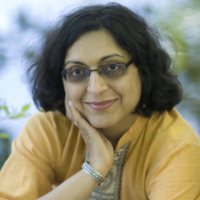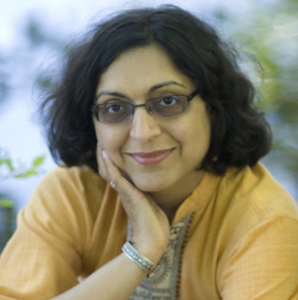Meeting Thrity Umrigar

Thrity Umrigar spent the first portion of her breakfast salon at The Betsy-South Beach, touting her good friend and fellow novelist Debra Dean, who was there to introduce her. Anyone not familiar with Umrigar might have taken her for a doting aunt — spelling Dean’s name for the audience so they can look up her books—but they became friends ten years before when Dean’s first novel, The Madonnas of Leningrad, and Umrigar’s breakout novel, The Space Between Us, came out within days of each other, from the same publishing company, the same editor, and the same agent. “On my part it’s because Thrity is such a great writer,” Dean said. “I’m a snob about that.”
A journalist and writing professor at Case Western Reserve University in Cleveland as well as a novelist, Umrigar arrived at The Betsy breakfast to engage with a large group of admirers, adoration aglow on their faces before Umrigar even took the podium. She did not disappoint, talking warmly about her books, her upbringing in Bombay with English as her first language, her move to the U.S. for graduate study, her journalism career, and even fielding questions about Zoroastrianism, the ancient faith into which she was born. Umrigar visited The Betsy in association with Writers on the Bay, a program sponsored by the Creative Writing Program at Florida International University.
“Being a journalist was the best training for a novelist,” Umrigar said. “One thing is simply the practice of writing every day. It’s the 10,000-hour theory — you must work at something for 10,000 hours before you master it. At a newspaper, nothing is pretentious. You don’t wake up and say, ‘I won’t file a story today because the sky is the wrong color.’ Journalism instills a certain work ethic.” Another form of training, she said, was “years and years of reading.”
Asked to name three books she would like to reread, Umrigar did not hesitate. Midnight’s Children, by Salmon Rushdie is, she said, a book like no other. East of Eden is a book whose author has fallen out of favor, but when she read it at 15 it “gave me a sense of myself as someone who could read and understand the complexities of that book.” The third is The Waves by Virginia Woolf. “Reading is an essential part of the writing craft,” Umrigar said. “You must carve out time for it. Many young people today want to write, but they don’t want to read. I don’t understand that.”
Umrigar grew up in a middle-class Bombay family, where her father was a businessman and her mother complained that Thrity read too much. At 21 she came to the United States for a two-year master’s degree in journalism, promising everyone in the family she would come back to India to live. At the end of the first year, she took a quick visit to India, and when she returned found herself bursting into tears at the sight of a U.S. flag at J.F.K. Airport. “That’s when I knew I was in trouble,” she said. “I told myself not to be sentimental. It was like falling in love with the wrong person. But this country has given me everything.”
A significant portion of Umrigar’s time that morning at the Betsy was spent answering questions about Zoroastrianism. “No one has ever asked me about this before,” she said. Founded in Persia some 3,500 years ago, Zoroastrianism is one of the oldest monotheistic religions. Umrigar is a Parsi, a member of an Indian community descended from the Zoroastrians who fled Persia ahead of the Muslim conquest 1,200 years ago.
Although she no longer practices Zoroastrianism, Umrigar said she considers the faith part of her identity. “I’ve come to value it,” she said. “Tolerance, good food–what’s not to love? The three principles are good thoughts, good words, good deeds.” The Parsis are a very small community in India, their existence endangered in part because they do not accept converts. “The global population is between 40,000 and 100,000,” she said. “The religion will be extinct in a generation or two. So take a good look. You are looking at a dinosaur.”


